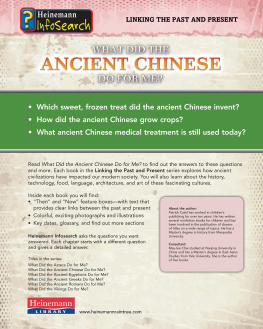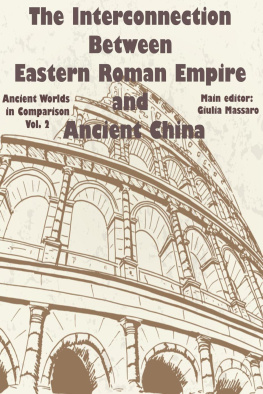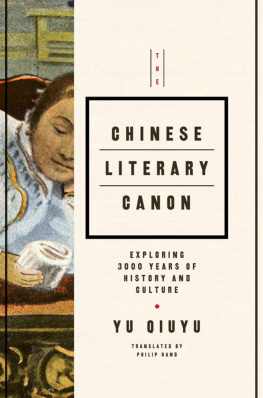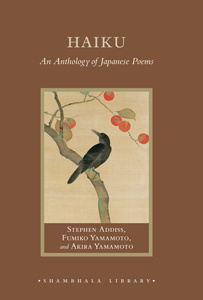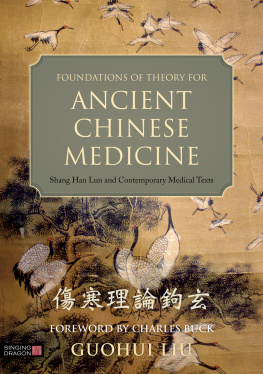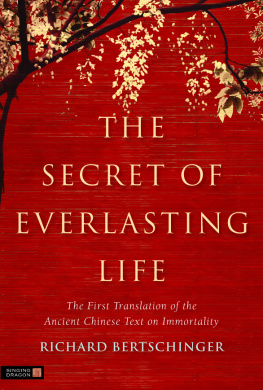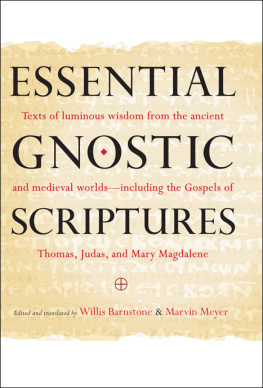Tony Barnstone - The Anchor Book of Chinese Poetry: From Ancient to Contemporary, The Full 3000-Year Tradition
Here you can read online Tony Barnstone - The Anchor Book of Chinese Poetry: From Ancient to Contemporary, The Full 3000-Year Tradition full text of the book (entire story) in english for free. Download pdf and epub, get meaning, cover and reviews about this ebook. year: 2005, publisher: Anchor Books, genre: Romance novel. Description of the work, (preface) as well as reviews are available. Best literature library LitArk.com created for fans of good reading and offers a wide selection of genres:
Romance novel
Science fiction
Adventure
Detective
Science
History
Home and family
Prose
Art
Politics
Computer
Non-fiction
Religion
Business
Children
Humor
Choose a favorite category and find really read worthwhile books. Enjoy immersion in the world of imagination, feel the emotions of the characters or learn something new for yourself, make an fascinating discovery.

- Book:The Anchor Book of Chinese Poetry: From Ancient to Contemporary, The Full 3000-Year Tradition
- Author:
- Publisher:Anchor Books
- Genre:
- Year:2005
- Rating:5 / 5
- Favourites:Add to favourites
- Your mark:
- 100
- 1
- 2
- 3
- 4
- 5
The Anchor Book of Chinese Poetry: From Ancient to Contemporary, The Full 3000-Year Tradition: summary, description and annotation
We offer to read an annotation, description, summary or preface (depends on what the author of the book "The Anchor Book of Chinese Poetry: From Ancient to Contemporary, The Full 3000-Year Tradition" wrote himself). If you haven't found the necessary information about the book — write in the comments, we will try to find it.
Tony Barnstone: author's other books
Who wrote The Anchor Book of Chinese Poetry: From Ancient to Contemporary, The Full 3000-Year Tradition? Find out the surname, the name of the author of the book and a list of all author's works by series.
The Anchor Book of Chinese Poetry: From Ancient to Contemporary, The Full 3000-Year Tradition — read online for free the complete book (whole text) full work
Below is the text of the book, divided by pages. System saving the place of the last page read, allows you to conveniently read the book "The Anchor Book of Chinese Poetry: From Ancient to Contemporary, The Full 3000-Year Tradition" online for free, without having to search again every time where you left off. Put a bookmark, and you can go to the page where you finished reading at any time.
Font size:
Interval:
Bookmark:
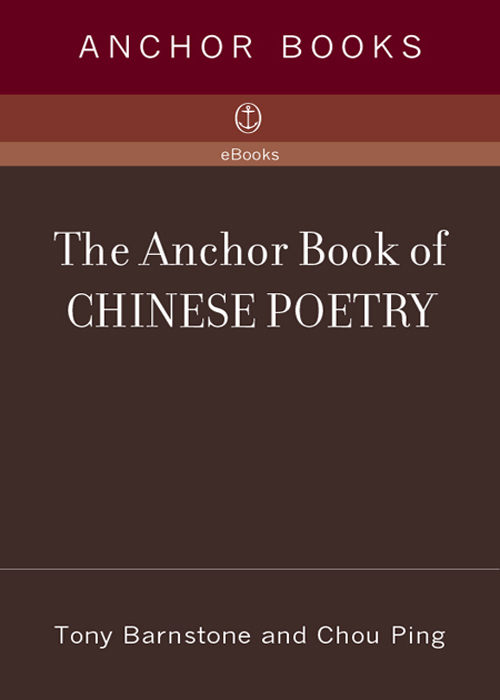
Tony Barnstone is an associate professor of creative writing and American literature at Whittier College. His first book of poetry, Impure, was a finalist for several national literary awards, among them the Academy of American Poets Walt Whitman Prize, the National Poetry Series Prize, and the White Pine Prize. His other books include Out of the Howling Storm: The New Chinese Poetry, Laughing Lost in the Mountains: Selected Poems of Wang Wei (with Willis Barnstone and Xu Haixin), The Art of Writing: Teachings of the Chinese Masters (with Chou Ping), and several textbooks about world literature. His poetry, translations, essays, and fiction have appeared in dozens of literary journals, from The American Poetry Review to Agni. He lives in California.
Chou Ping writes poetry in both Chinese and English. His poems and translations have appeared in such journals as The Literary Review and Nimrod. Born in Changsha City, Hunan province, in 1957, he holds degrees from Beijing Foreign Language University, Indiana University, and Stanford University. He is the translator, with Tony Barnstone, of The Art of Writing: Teachings of the Chinese Masters, and he has taught at Stanford, Washington University, Oberlin College, The College of Wooster, and Reed College. He lives in Oregon.
Please visit The Anchor Book of Chinese Poetry Web Companion: http://web.whittier.edu/barnstone/poetry
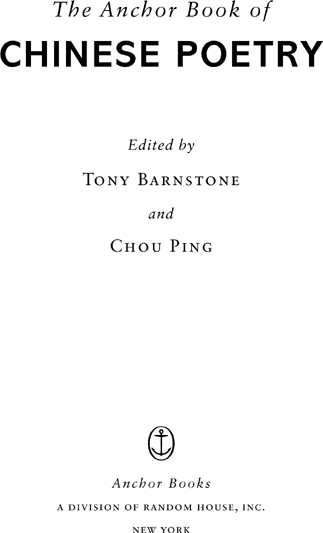
This book is dedicated to
Caroline Heldman
and
Joey
Preface: The Poem Behind the Poem:
Literary Translation as English-Language Poetry
BY TONY BARNSTONE
Introduction to Chinese Poetic Form
(as a Function of Yin-Yang Symmetry)
BY CHOU PING
ANONYMOUS FOLK SONGS FROM THE MUSIC BUREAU
(c. 120 bce)
Sending a Book to a Traveler After Making
an Inscription
Answering the Poem Su Left in My Blue Field Mountain
Country House, on Visiting and Finding Me
Not Home
About Old Age, in Answer to a Poem by Subprefect
Zhang
For Zhang, Exiled in Jingzhou, Once Adviser
to the Emperor
Seeing Off Prefect Ji Mu as He Leaves Office and Goes East
of the River
Visiting the Mountain Courtyard of the Distinguished Monk
Tanxing at Enlightenment Monastery
Seeing Meng Haoran Off to Guangling at the
Yellow Crane Tower
On My Way Down Zhongnan Mountain I Passed by Hermit
Fusi's Place and He Treated Me to Wine While I Spent
the Night There
Guest's Arrival: Happy About County
Governor Cui's Visit
Spending the Night at Hibiscus Mountain
When It Was Snowing
To the Tune of Dreaming of the South Side
of the River
Visiting Chongzhen Temple's South Tower and Looking Where
the Names of Candidates Who Pass the Civil Service
Exam Are Posted
The Lamp-wick's Ashes, Blossoms Droop,
the Moon Like Frost
Painting Eyebrows, to the Tune of Pouring Out Deep
Emotions
Walking Back in Moonlight from Bohdi Trees to the
Guanghua Temple
Written While Living at Dinghui Temple in Huangzhou,
to the Tune of Divination Song
ANONYMOUS (the girl who took the gold cup)
(early twelfth century)
Feelings Recollected on Returning from Fahua Mountain
on a Wintry Day, to the Tune of Waves Scour
the Sands
A Poem Written at Mr. Ishii's Request and Using the Same
Rhymes as His Poem
FROM MODERN TO CONTEMPORARY
(1911-Present)
IN THIS ANTHOLOGY WE HAVE ATTEMPTED TO BRING TOGETHER into one volume the essence of Chinese poetry. The selection begins with the Book of Songs (the ancient anthology of folk songs supposedly collected by Confucius himself) and culminates in the political and experimental poetry of contemporary Chinese poets, many of whom are in political exile in the diaspora that followed the Tiananmen Square massacre of 1989. We have sought to represent in fine translation the well-established canon of great Chinese poems, and to deviate from that canon in ways we found interesting. Here you will find many of the familiar classical gems, popular favorites, and anthology pieces, and yet we have chosen to cut out old touchstones that don't fare well in translation in favor of including poems that read in English as poems in and of themselves. We have also attempted to adjust the canon, here and there, to shine a spotlight on fine poets whose work is often overlooked, and especially to make room for the poems of Chinese women. In the classical Chinese anthologies, the voices of women were largely ignored. Relegated to a few pages at the end of the volumes, they have survived the ravages of the centuries at significantly lower rates than those of men. The work of many of the finest Chinese women poets has been lost entirely. Those we know are represented by only a few poems or a few dozen poems, if we are lucky (while for many male poets, hundreds or even thousands of poems survive). Perhaps one could argue that we are skewing the canon by including a fifth of the fifty extant poems of the great woman poet
Li Qingzhao, while including only one thousandth of the poems of Lu You, who wrote more than ten thousand poems. However, our goal is not to be merely representative in this anthology. We have chosen to swell the selections of poets whose work we particularly admire (Tao Qian, Wang Wei, Li Bai, Du Fu, Bai Juyi, Han Shan, Su Shi, Mao Zedong, Bei Dao, and others) so that the reader can truly come to know their work. We consider such larger selections to be pillars that support the book, little books or chapbooks within the larger book that show the range and development and depth of the finest poets of this extraordinary tradition.
To aid the general reader (as well as students and scholars of Chinese) in navigating such a large selection of work by so many poets, we have provided an author index with both Pinyin and Wade-Giles transliterations of the authors' Chinese names. To help give readers the context necessary to ground their reading of this selection from three millennia of Chinese poetry, we have outfitted the book with an essay on the key issues that confront the English-language translator of classical and contemporary Chinese poetry, a short history of the development of Chinese literary forms, and introductions to each major historical period.
I would like to thank the poet and novelist Ha Jin for generously putting us in touch with Anchor Books and helping this project find a home. I would also like to thank our editor, LuAnn Walther, and John Siciliano at Anchor Books, for their patience with the book's slow development and for making the project possible. Although the majority of the selections in the volume have been team-translated by Chou Ping and myself, I supplemented our translations with exceptional examples by my father, Willis Barnstone, and by other poet-scholar-translators of Chinese, among them Arthur Waley, Sam Hamill, Kenneth Rexroth, David Hinton, Xu Haixin, Eliot Weinberger, Newton Liu, Ko Ching-p'o, Burton Watson, Michelle Yeh, Arthur Sze, Gregory B. Lee, John Cayley, A. C. Graham, J. P. Seaton, John Rosenwald, Mabel Lee, Sun Chu-chin, Bonnie S. McDougall, Chen Maiping, James A. Wilson, and Ho Yung. They have played an extraordinary role in carrying Chinese poetic genius across oceans and centuries and transplanting it in American soil, and I would like to thank them for allowing me to reprint their translations here. Finally, I would like to thank my coeditor and primary cotranslator for his good humor and insight, which have made it a pleasure to work with him on this and other projects since we first met in my small apartment in Beijing in the winter of 1984.
Font size:
Interval:
Bookmark:
Similar books «The Anchor Book of Chinese Poetry: From Ancient to Contemporary, The Full 3000-Year Tradition»
Look at similar books to The Anchor Book of Chinese Poetry: From Ancient to Contemporary, The Full 3000-Year Tradition. We have selected literature similar in name and meaning in the hope of providing readers with more options to find new, interesting, not yet read works.
Discussion, reviews of the book The Anchor Book of Chinese Poetry: From Ancient to Contemporary, The Full 3000-Year Tradition and just readers' own opinions. Leave your comments, write what you think about the work, its meaning or the main characters. Specify what exactly you liked and what you didn't like, and why you think so.

